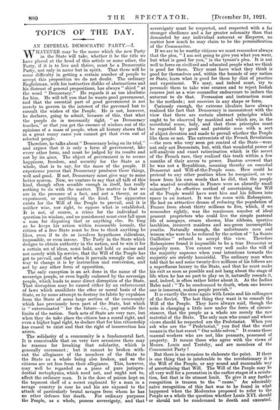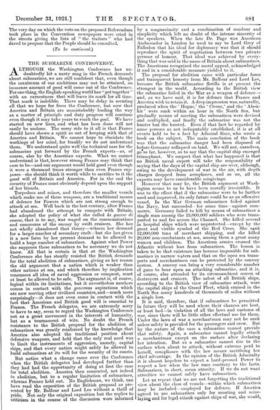TOPICS OF THE DAY.
AN IMPERIAL DEMOCRATIC PARTY.—I.
WHATEVER may be the name which the new Party in the State will take, whether it be the title we have placed at the head of this article or some other, the Party, if it is to live and thrive, must be a Democratic Party, not only in name but in spirit. That there will be some difficulty in getting a certain number of people to accept this proposition we do not doubt. The ordinary Englishman, with his instinctive dislike of abstractions and his distrust of general propositions, has always " shied " at the word " Democracy." He regards it as too idealistic for him. He will tell you that he wants good government, and that the essential part of good government is not merely to govern in the interest of the governed but to consult the wishes of the People. He is not, however, he declares, going to admit, because of this, that what the people do is necessarily right, " as Democracy teaches," or that you get the essence of wisdom out of the opinions of a mass of people, when all history shows that in a great many cases you cannot get that even out of selected people.
Therefore, he talks about " Democracy being on its trial," and argues that it is only a form of government, like every other form, and must be judged by its results and not by its aims. The object of government is to secure happiness, freedom, and security for the State as a whole, that is to say, for the mass of the people. If experience proves that Democracy produces these things, well and good. If not, Democracy must give way to some better system. Now, we venture to say that all talk of this kind, though often sensible enough in itself, has really nothing to do with the matter. The matter is that we are in the presence of a fact, and not a theory, or an experiment, or anything of the kind. The apparatus exists for the Will of the People to prevail, and it is neither wise, nor right, to oppose what. is established. It is not, of course, a crime for the individual to question its wisdom, and no punishment must ever fall upon a man for disputing that or anything else. So long as he keeps his action within reasonable bounds, the citizen of a free State must he free to think anything he likes, even if to do so involves hypotheses ridiculous, impossible, or even insane. The Party in the State which designs to obtain authority in the nation, and to win it for a certain set of ideas, must hold, and hold ex ammo and not merely with lip service, that the Will of the People has got to prevail, and that when it prevails wrongly the only way to change it is by instruction and conversion, and not by any other form of opposition.
The only exception is an act done in the name of the sovereign people, or even legally endorsed by the sovereign people, which leads to some direct disruption of the State. That disruption may be caused either by an enforcement of laws which annihilate the ethos or moral basis of the State, or by some attempt to destroy its fabric by expulsion from the State of some large section of the community which has previously been part of the State, but which is " exterminated " for the future—i.e., put outside the limits of the nation. Such acts of State are very rare, but when they do take place the citizen has a moral right, and even a higher legal right, to declare that for him citizenship has ceased to exist and that the right of insurrection has arisen.
The solidarity of a community is a fundamental fact. It is conceivable that on very rare occasions there may be reasons for breaking that solidarity, which is generally sacrosanct ; but it cannot be broken with- out the allegiance of the members of the State to the State as a whole being also broken, and so the citizens are set free from their allegiance. This, however, may well be regarded as a piece of pure jurispru- dential metaphysics, which need not, and ought not to, affect the ordinary man. It is the dose of poison kept on the topmost shelf of a secret cupboard by a man in a savage country in case he and his are exposed to the attack of particularly brutal savages from whom he has no other defence but death. For ordinary purposes the People, as a whole, possess sovereignty, and that sovereignty must be respected, and respected with a far stronger obedience and a far greater solemnity than that demanded by any individual autocrat or Emperor, no matter how much he may claim to be the personification of the Communitas.
If we are to be worthy citizens we must remember always that the plea, " I am not going to give you what you want, but what is good for you," is the tyrant's plea. It is not well to force on civilized and educated people what we think is good for them. They must have what they think is good for themselves and, within the bounds of any nation or State, learn what is good for them by dint of practice and experiment. We may, and indeed must, try to persuade them to take wise courses and to reject foolish courses just as a wise counsellor endeavours to induce the autocrat to do that. Persuasion and instruction must be the methods ; not coercion in any shape or form. Curiously enough, the extreme idealists have always realized the fact that Democracy is inconsistent with the view that there are certain abstract principles which ought to be observed by mankind and which are, in the sacerdotal sense, holy, and that these principles must be regarded by good and patriotic men with a sort of abject devotion and made to prevail whether the People like them or not. The extremists of the French Revolution —the men who very soon got control of the State—were not only not Democrats, but, with that wonderful power of self-analysis and exact ratiocination which is the secret of the French race, they realized this truth within a few months of their access to power. Danton avowed that he was not a Republican, meaning thereby an essential Democrat and Will-of-the-People man. How could he pretend to any other position when he recognized, as we know from his own words that he did, that the people who wanted revolution in France were an absurdly small minority? An effective method of ascertaining the Will of the People would have sent him and his fellows into space in an instant. It was the same with Robespierre. He had an attractive dream of reducing the population of France from about thirty millions to five, which, if we remember rightly, was the maximum number of ideal peasant proprietors who could live the simple pastoral life of nosegays, cream cheeses, blue ribbons, sportive lambkins, innocent maidens and sea-green incorruptible youths. Naturally enough, the unfortunate men and women who were to be reduced by the action of " La Sainte Guillotine " refused to accept this view. Therefore Robespierre found it impossible to be a true Democrat or majority man. You cannot very well make the will of the majority supreme when your intentions towards the majority are strictly homicidal. The ordinary man when told that he and some twenty-five millions of his fellows are a superfluous luxury to the State, and that he must make his exit as soon as possible and not hang about the stage of life when he has no part to play on it, naturally resents it, and, indeed, is often rather bitter about it. As the Indian Balm said : " To be condemned to death, when one knows one is innocent, makes people peevish." It is exactly the same again with Lenin and his colleagues of the Soviet. The last thing they want is to consult the Will of the People. They have always said, though the note is changing a little now under the force of circum- stances, that the people as a whole are merely the raw material of the State. The only men who count and whose views should be respected are the Proletariat. When you ask who are the Proletariat," you find that the word means in the last resort " Our noble selves." It means those manual workers who are not, like peasants, possessed of property. It means those who agree with the views of Messrs. Lenin and Trotsky, and are members of the Communist Party ! But there is no occasion to elaborate the point. If there is one thing that is intolerable to the revolutionary it is the Will of the People, or any sound and reasonable way of ascertaining that Will. The Will of the People may be all very well for a peroration in the earlier stages of a revolu- tion, but that is its utmost limit. To give it any further recognition is treason to the " cause." An admirably naive recognition of this fact was to be found in what happened when the Moderates proposed to refer to the People as a whole the question whether Louis XVI. should or should not be condemned to death and executed. The very day on which the vote on the proposed Referendum took place in the Convention newspapers were cried in the streets giving the lists of " the traitors " who had dared to propose that the People should be consulted.
(To be continued.)



































 Previous page
Previous page